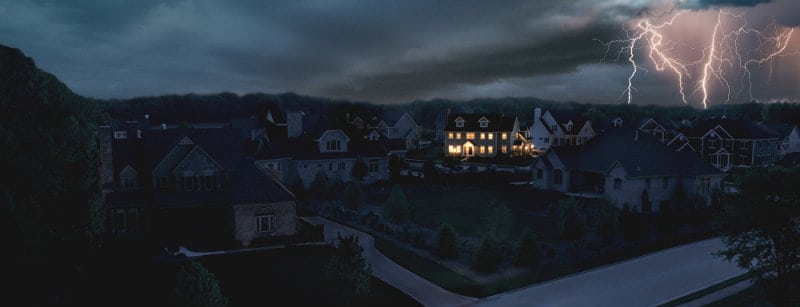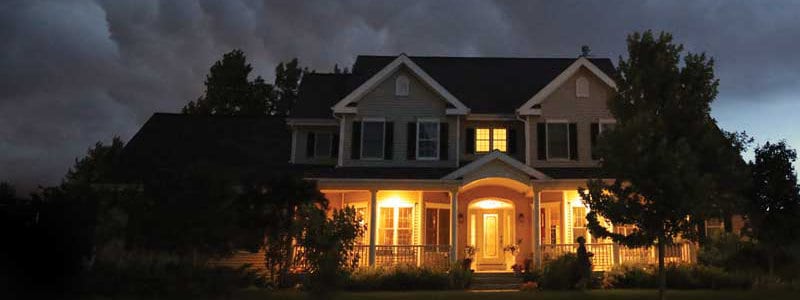FEMA Recommends a Backup Generator for Emergency Preparedness
Hurricane Preparedness Articles
- 7 Step Hurricane Preparedness Plan
- Hurricane Hazards and Risk Factors
- Make a Hurricane Evacuation Plan
- Hurricane Preparedness Kits and Supplies
- Hurricane Insurance Checkup and Updates
- Prepare Your Home for Hurricanes
- Help Neighbors with Hurricane Preparedness
- Complete Your Hurricane Preparedness Plan
- Emergency Preparedness Tips
- How to Prepare for a Power Outage
- 10 Tips to Survive a Hurricane Disaster
- FEMA Recommends a Generator
- Hurricane Disaster Preparedness
At one time, enduring a power outage wasn’t all that bad. Sometimes, it could even be a little fun. Bring out the candles and the oil lamps, build a fire in the fireplace and camp out in the living room. Life was simpler then and we didn’t worry about losing power for a few hours or even a few days.
Times have changed and our reliance on electricity grew beyond the basics. Without electricity, our homes no longer heat themselves. New home construction techniques require sump pumps in the basement, and without power, flooding can occur very quickly during a heavy rainstorm. Let’s not forget the food in the refrigerator or the freezer.
For some people, electricity is required for life. Such was the case following a 2011 snowstorm on the East Coast when a 77-year-old great grandmother died during the power outage because her oxygen machine didn’t work. Today, life-sustaining home medical equipment is more common than ever with CPAP machines, oxygen concentrators, and even dialysis. Some medications require refrigeration to stay safe and usable.
After the 2011 Snowstorm, an release by the Federal Emergency Management Agency (Emergency Generators, an Alternative Worth Considering) suggested homeowners consider the purchase of a portable or backup generator.
A Power Cell Energy Storage + Solar Array is an option where consistent sunshine can power a home or business during the day and switch to stored energy after the sun goes down. Areas without consistent sunshine can charge batteries from grid power when the sun isn't available. The Generac PWRcell Solar + Storage system scales from 9kWh to 36kWh of energy storage and can charge the PWRcell Battery Cabinets from a PV Solar Array or from the grid. Unlike competing systems from Tesla or LG, PWRcell supplies the main circuit breaker panel with up to 11kW. Other brands have less power and only supply a sub-panel.
Portable vs. Standby

The Generac PowerPact 7.5 Kilowatt Keeps Essential Circuits Operating
Portables have two advantages. They can go anywhere you need power—camping, construction sites, picnics, and tailgate parties, or even the back of the backyard where it takes two or three extension cords to reach. Just name it, if you can think of anyplace you’d like power, the portable generator does the work, including powering a few necessities at home during an outage.
The other obvious advantage—small portables cost less than a backup generator.
Permanently installed appliances similar to a furnace or central air conditioning unit, home backup generators connect directly to your home’s electrical system through an automatic transfer switch. They run on natural gas or propane which means you don’t store multiple containers of gasoline that goes stale every six to twelve months. Just seconds after an outage occurs, they restore power automatically—even if you’re not home.
The downside—you can’t take them camping and they cost more.
Buyer Guide: What Size Generator Do I Need?
Consider this scenario. It’s two in the morning. Outside, an ice storm is coating everything with ice, including the power lines. A branch on a tree breaks falls on the utility line, and your power is out. Across the surrounding area where you live, other power lines break and utility crews find themselves overburdened with repairs. It could be hours before your power comes back on, or maybe even a day or two. The house starts to get cold. At the same time, your refrigerator is no longer cooling and gradually getting warmer inside.
If you're prepared, one of two things will happen:
- Your home standby generator starts a few seconds after the power goes and the power comes back on; Automatically.
- You wait an hour or two at the most to see if the power is restored. When it doesn't, you head outside to set up the portable generator. You fill it with your stored fuel and make the connections to a manual transfer switch for a generator or run some extension cords. You're all set for the next six to ten hours when you'll have to refuel. Portable Generators are not automatic and most can't power your entire house, but they can keep the essentials running.
Generator Cord for Portable Generators
Portable Generator Safety Rules to Live By
Disasters and Power Outages

Will Your Home Have Power During the Next Outage or Disaster?
In the last ten years, the United States Government has declared more than 1000 disasters nationwide. That does not include disasters declared at the local or state level of which there are many. On average, the U.S. government declares more than 100 disasters every year. Many of those disasters include power outages that take days or weeks to restore power. After Hurricane Sandy, some people were still without power after five weeks.
In 2017, three major hurricanes affected more than 25 million U.S. residents. Just Sixteen Weather Disasters Each Caused at Least a Billion Dollars of Damage, and the hurricanes many times more. These disasters affected millions of people in nearly every region of the country.
The fact is, Disasters Don’t Plan Ahead. You Can. Automatic Natural Gas Generators for Home Use keep the power on throughout an outage, whether they last a few hours or go on for weeks.
Across the country, there is no region immune to disasters. The East and Gulf Coasts have hurricanes and tropical storms. Much of the interior South, East, and Midwest experience ice storms and snowstorm. Nor’easters on the northern East Coast. Earthquakes in the West. Tornadoes are possible just about everywhere.
Everyone should make a disaster plan and gather the resources needed. Any plan and the preparation that goes with it should include an emergency source of power. Choosing between a portable generator or a home standby is a choice that homeowners make based on their local infrastructure and the history of outages in their area.

